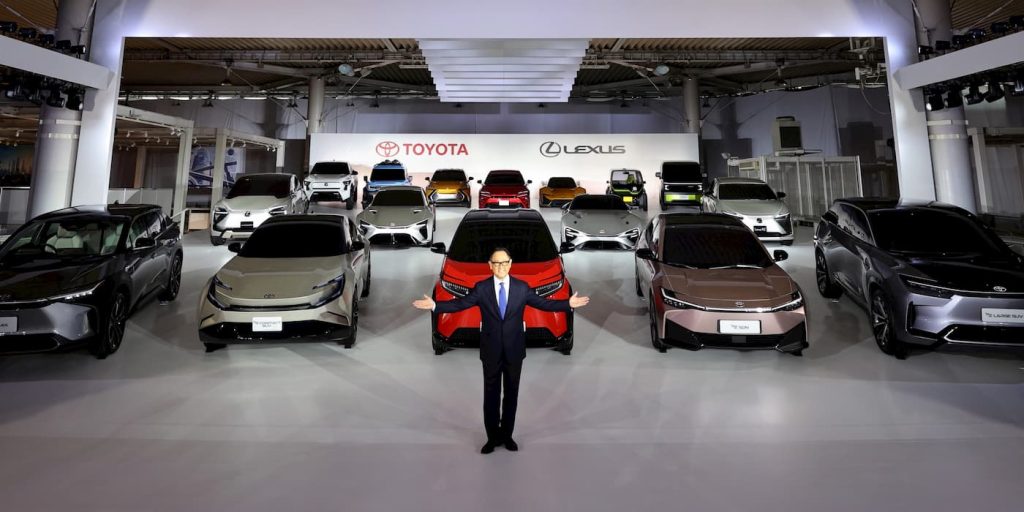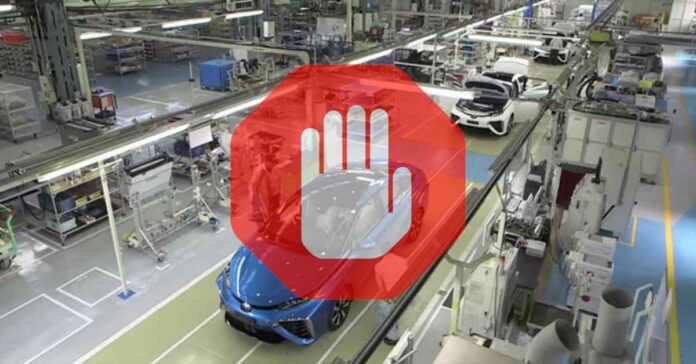Toyota is once again facing scrutiny under Chairman Akio Toyoda’s leadership, and two of the Japanese automaker’s largest shareholders have seen enough. Following a recent report of misconduct regarding inadequate vehicle verification testing amid a previous wave of certification violations, the descendant of Toyota’s original founder is on the hot seat.
The woes continue for Toyota Motor Company – one the global market leaders in automotive that have caught our ire dozens of times for its waffled and often insincere commitment to electrification under current chairman Akio Toyoda – the great-grandson of the company’s founder Sakichi Toyota.
In May 2024 alone, Toyota once again earned the crown as the worst automaker in global climate lobbying, solidifying its spot as a bottomfeeder in InfluenceMap’s annual climate policy engagement rankings.
Just last week, Toyota and its fellow Japanese automakers, Subaru and Mazda, touted a commitment to developing next-generation combustion engines, hailing them as being “tailored to electrification” with integrated EV components. Whatever that means.
While Toyota tries to play catchup in a growing global market of BEVs, it has recently faced a number of certification headaches in Japan. In 2022, Toyota Group subsidiary Hino Motors got nabbed for forging emission certifications. This past December, Toyota minicar subsidiary Daihatsu had to suspend global shipments after it was caught rigging its side-collision safety tests, forcing 300,000 vehicle recalls.
This past January, Toyota was forced to halt global shipments of ten models after their respective engines were found to have faced improper horsepower and torque testing. Chairman Akio Toyoda called all 17 of Toyota Group’s brands together to share he would be keeping a close eye on their testing procedures to ensure such violations wouldn’t happen again.
Just months later, the chairman’s brand is caught in the same crossfire, and shareholders want Toyoda out.

Shareholders plead not to re-elect Toyota Chairman
Per a report by Automotive News Europe, Toyota Motor has been forced to halt shipments of at least three models due to improper vehicle verification data, including safety tests. According to a statement from Japan’s Ministry of Transportation on Monday, Mazda, Honda, Yamaha, and Suzuki were also cited for similar violations.
Following the Ministry’s announcement of the verification violations, Toyota Chairman Akio Toyoda apologized during a news conference but said that out of tens of thousands of tests conducted by the Japanese automotive conglomerate, only six violations have been discovered—at least so far.
Toyoda went as far as to state that many of the reported problems resulted from higher safety testing standards than what is required by Japan’s Ministry for certification. Still, Toyota’s chairman of more than ten years relayed a sentiment of remorse:
The vehicles were produced and sold without going through the correct certification process. I am truly sorry.
Although the vehicles are still safe to drive, according to Toyoda, the automaker still failed to obtain the necessary waivers from the Ministry of Transportation before these issues arose, nor did it conduct retests to the specifications required by regulators.
Today’s controversy is merely the latest surrounding Toyota and Chairman Toyoda and appears to be the last straw for at least two major shareholder proxy groups: Glass Lewis & Co. and Institutional Shareholders Services (ISS).
The groups were already rallying against reappointing Chairman Toyoda to the board of the company due to the previous certification cheats mentioned above, but are now relaying even less confidence in Toyota’s leader, claiming he should personally be held responsible for these public issues and the company ethos that has helped enable them. Per ISS’ June position paper:
In consideration of the current situation where a spate of certification irregularities occurred in the Toyota Motor group, shareholders are advised to vote against Chairman Akio Toyoda. Fundamentally, corporate culture will be created from the top down, not vice versa. When no changes are being made at the director level, it appears questionable whether the company’s approach is effective.
Toyota said the affected vehicles face zero performance issues that break the law, so there is no need to stop driving them in Europe and Japan. However, Toyota has halted outgoing shipments while it cooperates with the Ministry.
As for the Chairman’s future, Toyota has an annual shareholders meeting this month, and Toyoda’s future role at the company will undoubtedly be up for discussion. Stay tuned.


